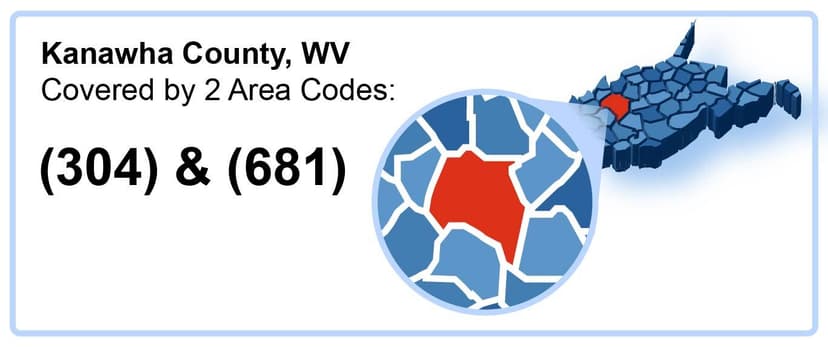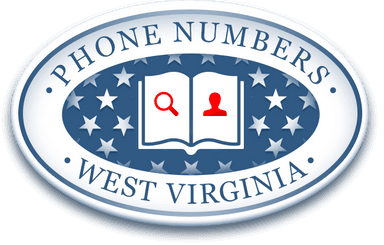What are Kanawha County Area Codes?

Area codes are the set of three digits that begin every North American telephone number. They were introduced as part of the North American Numbering Plan (NANP). Area codes serve the purpose of identifying the different phone service areas otherwise referred to as numbering plan areas. The West Virginia Public Service Commission (WVPSC) is charged with implementing and administering area codes in Kanawha County.
There are currently two area codes that cover Kanawha County. These area codes also serve all the existing counties in the State of West Virginia.
Area Code 304
Area code 304 covers all 55 counties and 260 cities under the State of West Virginia. It was introduced in October 1947 as one of the original 86 area codes created by AT&T and the Bell System.
Area Code 681
Area code 681 is the NANP overlay code for area code 304. It was assigned on January 30, 2008. However, it was only officially put into service in March 2009. Area code 681 covers 51 counties and 194 counties under West Virginia. Area code 681 is a General Purpose Code.
What are the Best Cell Phone Plans in Kanawha County?
A 2018 National Center of Health Statistics survey estimated that 52.6% of West Virginia adults exclusively used wireless telephone services, with only about 5.7% of the population preferring to use just landlines. Among minors (under the age of 18), 66.7% relied solely on wireless-only services, while landline-only users totaled 1.4% of the population. These numbers indicate that cell phones have overtaken landlines as the preferred means of telephone service in Kanawha County.
The major phone carriers- AT&T, Verizon, T-Mobile, and Sprint, along with several other Mobile Virtual Network Operators (MVNOs), all provide pretty decent coverage within the Kanawha County area. At&T and Verizon offer the best service with about 92% coverage. Sprint follows closely behind with about 82% service coverage, while T-mobile offers the least service coverage with 44%. However, service availability tends to be spotty in densely populated places, rural areas, and spaces between tall buildings.
Voice over Internet Protocol (VoIP), also known as IP telephony, is a technology that uses Internet Protocol (IP) networks to facilitate the delivery of calls and multimedia sessions. In recent times, VoIP services have gained widespread usage, especially because of their benefits of affordability and flexibility in plans.
What are Kanawha County Phone Scams?
Kanawha County phone scams are phone calls that target Kanawha County residents in an attempt to fraudulently trick them into giving out their money, personal or financial information. These scams often come in varying ways, through calls from actual people, robocalls, or text messages. Reverse phone number lookup services are adept at identifying such scammers. Common scams committed in Jackson County include:
What are Kanawha County Impersonation Scams?
In this scam, the caller identifies as a deputy from the Kanawha County Sheriff’s Office (KCSO). Usually, scammers here demand payment of nonexistent fines by accusing the targets of offenses such as unpaid taxes or missed court duties. They even go as far as threatening to arrest the persons they have called if they hesitate to make immediate payments. They request bail-out payments through bank wire transfers, prepaid cards, gift cards, or bitcoin. Other times, they ask their targets to make available their card details as well.
Residents who receive calls requesting such should outrightly reject the demands and hang up the call. Reverse phone lookups are helpful in identifying the actual caller. Sometimes, however, scammers spoof their Caller IDs to appear like the Sheriff’s Office’s Caller IDs. Nonetheless, residents are warned to always verify any request made by persons claiming to be from the KCSO. They can easily do this by calling their 24-hour number, 304-357-0169. The state has warned that the Sheriff’s department and other law enforcement deputies will never contact residents on the phone to solicit for payment of any sort. Residents should note that all fines from actual criminal charges are usually paid in the Magistrate Court, and any warrants issued in the County are normally addressed in person.
What are Kanawha County Cell Phones Provider Scams?
Cell phone provider scams have become a raving trend in Kanawha County, especially amongst Verizon users. Here, scammers call their targets, claiming to be officials from their service providers. The scammers send texts to their targets telling them that their phones are malfunctioning. They then request that their targets text them back with their PINS (personal identification number) to resolve the issue. If the targets do this, they then go ahead to access their personal information. Due to its very original, sophisticated, and subtle approach, many persons unknowingly fall for this scam.
County residents are advised to contact the legitimate carrier numbers listed on their monthly bills if they ever have questions, doubts, or needs. If you ever receive such a call, a free reverse phone lookup service can help you answer the question, “who is this number registered to?”
What are Kanawha County Promo Scams?
Scammers call county residents and offer them huge cash wins. They tell them that they have received checks in their emails. The amounts are usually huge enough to tempt their targets to follow through with their instructions. Sometimes, they tell them they have won bonus prizes. Other times, they tell them they have been randomly selected as lottery winners. To facilitate the clearing of the money, they tell their targets to provide their bank details. It is common to see them impersonate actual companies and organizations to appear even more believable. They may even go as far as spoofing the Callers IDs of these organizations.
Reverse cell phone lookup services can verify if these types of calls are actually from legitimate businesses. County residents are advised to be cautious when giving out their sensitive financial or identity details. Before doing so, make sure you have verified the caller by contacting the firms they claim to represent.
What are Kanawha County Covid-19 Scams?
The scammers in these scams contact residents claiming to be county officials affiliated with Covid-19 testing and treatments. While on call, they request that their targets furnish them with certain sensitive personal or identity details. These could range from their social security numbers, their credit card details, or other personal financial information. They tell them that all of these are requirements to be considered before they can be screened, treated, or given medications.
Residents of Kanawha County are asked to hang up on persons claiming to provide Covid-19 assistance in exchange for their personal details. Targets are also advised to contact the office of the Kanawha Sheriff to report such incidences. Reverse phone number search services help identify who called.
What are Robocalls and Spam Calls?
Robocalls are automated phone calls initiated by predictive dialers to deliver pre-recorded messages to the recipients. Robocalls are a common strategy associated with political and telemarketing campaigns as well as non-profit organizations. In recent times, the use of robocalls has increased amongst legitimate businesses and scammers alike. The reasons are easy to guess. Robocalls provide their users the leverage of affordability and anonymity. Scammers leverage robocalls to impersonate legitimate businesses and, in that way, retrieve customers’ and consumers’ personal information. Reverse phone lookup services are pivotal in determining if an incoming call is a robocall.
This is what you should do if you receive a robocall:
- Hang up immediately. Command prompts and instructions are usually given over the call. Ignore the prompts, as responding to them will only lead to more automated messages.
- Register on the National Do Not Call Database. Numbers listed in the registry for 31 days or more are exempted from receiving robocalls. Any robocall received after this period is most likely a scam call.
- Use online services that offer phone number search free of charge to identify robocalls and block the phone numbers once identified.
- Inquire from your phone service providers about how to block numbers.
- File complaints of illegal robocall to the FTC online or call 1-888-382-1222.
The FTC’s website provides other helpful consumer tips in blocking unwanted calls on any platform.
How Can You Spot and Report Kanawha County Phone Scams?
Scams are not new in Kanawha County. However, scammers have become more manipulative in their approach, and it only makes sense that county residents are well informed, so they do not fall victim. Services that perform reverse phone lookups free of charge can help in identifying the actual callers. However, awareness and education remain the most potent means of curbing the activities of scammers. Here is how to determine if a suspicious call is a spam call:
- The caller acts aggressively. Scammers often employ instruments of pressure and fear in coercing their targets to reveal their sensitive details. These may include threats to arrest them, seize their licenses, fine them, or cut off whatever services they may be enjoying. Legitimate companies rarely request confidential information. If you receive calls requesting such, they are most likely scams.
- The scammer specifies strictly how to make required payments. Usually, these payment channels will differ from the regular ones the target may have been used to. It may include bank wire transfer, bitcoin, prepaid debit cards, gift cards, and FedEx Cash.
- The caller tries to get their target to take all required actions while on call. They do this to dissuade them from verifying their claims or, in the case of investment scams, backing out before they commit.
- The caller proposes mouth-watering investment deals, offers, and opportunities with little to almost no risk. Usually, they create a sense of urgency to promote immediate action. The offers are also usually tempting enough to distract the target from doing proper research.
Totally eliminating the occurrence of scammers and their activities may seem like an uphill task. However, services that perform reverse phone number lookups by name, number, and address can help identify and curb the menace of phone scammers.
Several public organizations work to provide assistance and education for Kanawha County residents in dealing with scammers. Residents who have been victims of scams may report or file complaints with any of the following agencies:
Kanawha County Sheriff's Office - The Kanawha County Sheriff's Office provides residents with information and updates on prevalent scams in the county. County residents who may have fallen prey to phone scammers may register their complaints by calling their 24-hour number at 304-357-0169 or by reporting online on their website.
West Virginia State Attorney General's Office Consumer Protection Division - The West Virginia State AG’s Office’s Consumer Protection Division works to protect residents against consumer-associated fraud and other unfair business practices. They ensure that businesses are carried on safely and fairly and that businesses that contravene set rules are prosecuted. Victims may file their complaints to them online or call Consumer Protection Hotline 1-800-368-8808.
Federal Communications Commission (FCC) - The FCC administers interstate communications in the U.S. They ensure that consumers are protected from Caller IDs spoofing scams and unlawful robocalls. Instructions as to how to avoid unwanted robocalls and phone scams are available on their website. Victims of such offenses may file complaints with the FCC.
Federal Trade Commission - The FTC protects consumers from unlawful, deceptive, and fraudulent business practices. The National Do Not Call Registry is part of their efforts at helping scale through unwanted calls. Numbers registered on the DNC are exempted from receiving robocalls. If you continue to receive robocalls even after registering on the DNC database, it is most likely the case of scam calls.
